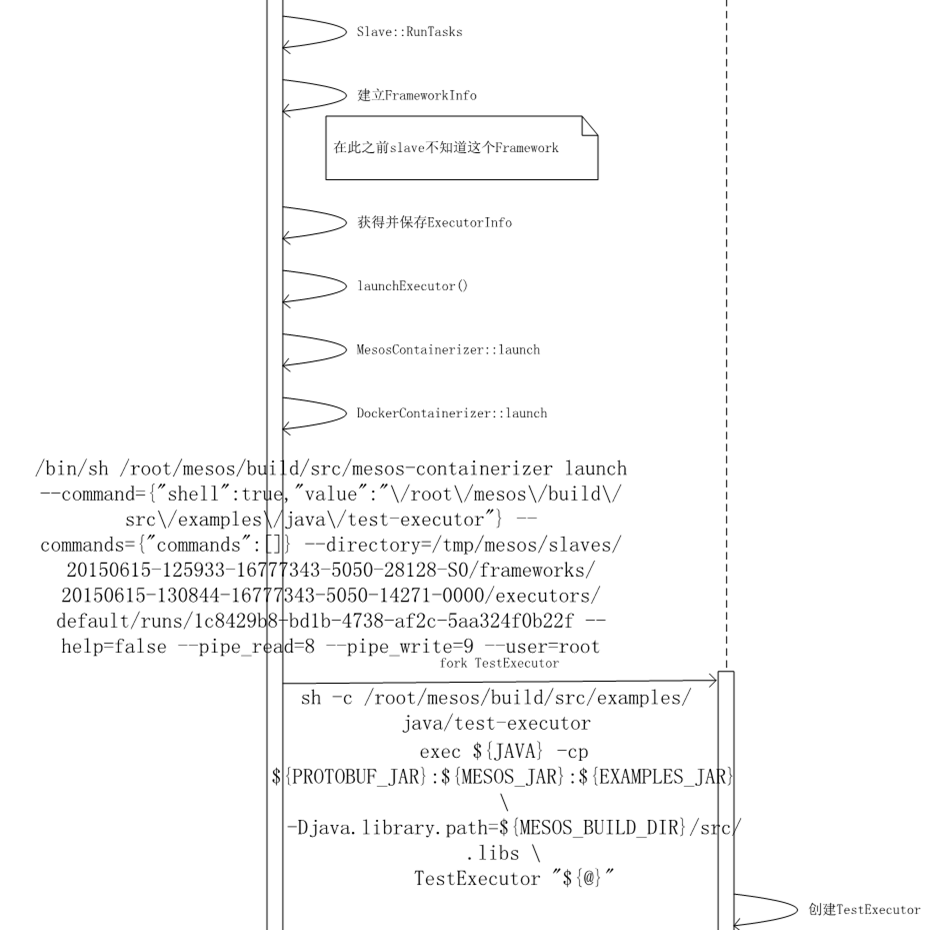Mesos源码分析(13): MesosContainerier运行一个Task
MesosContainerizer的实现在文件src/slave/containerizer/mesos/containerizer.cpp中
|
转而调用MesosContainerizerProcess::launch,只有executorInfo.has_container()是Mesos的时候,才使用MesosContainerizer.
|
大家注意ExecutorInfo里面的ContainerInfo和TaskInfo里面的ContainerInfo不同。
如果大家看protocol buffer的定义文件include/mesos/mesos.proto里面,ExecutorInfo里面有一个ContainerInfo
|
如果ExecutorInfo的ContainerInfo有值,则executor会启动在这个container里面。
那marathon里面的container info放在哪里呢?
TaskInfo里面也有一个ContainerInfo
|
如果TaskInfo里面的ContainerInfo有值,才是真正的运行容器,容器里面运行任务。
最终会调用MesosContainerizerProcess::__launch
|
最终运行的二进制文件为const char MESOS_CONTAINERIZER[] = "mesos-containerizer";
Mesos-containerizer是一个独立运行的二进制文件,它的main函数在src/slave/containerizer/mesos/main.c
|
Src/slave/containerizer/mesos/launch.cpp中MesosContainerizerLaunch::execute()函数最终调用
|
来运行executor的二进制文件。
如果是前面叙述的TestFramework,则运行的executor是TestExecutor,也就要求mesos-slave的相应目录下有这个二进制文件。

Mesos源码分析(13): MesosContainerier运行一个Task的更多相关文章
- Mesos源码分析(14): DockerContainerier运行一个Task
DockerContainerizer的实现在文件src/slave/containerizer/docker.cpp中 Future<bool> DockerContainerize ...
- Mesos源码分析
Mesos源码分析(1): Mesos的启动过程总论 Mesos源码分析(2): Mesos Master的启动之一 Mesos源码分析(3): Mesos Master的启动之二 Mesos源码分析 ...
- Mesos源码分析(10): MesosSchedulerDriver的启动及运行一个Task
MesosSchedulerDriver的代码在src/sched/sched.cpp里面实现. Driver->run()调用start() 首先检测Mesos-Maste ...
- Mesos源码分析(12): Mesos-Slave接收到RunTask消息
在前文Mesos源码分析(8): Mesos-Slave的初始化中,Mesos-Slave接收到RunTaskMessage消息,会调用Slave::runTask. void Slave::ru ...
- Solr4.8.0源码分析(13)之LuceneCore的索引修复
Solr4.8.0源码分析(13)之LuceneCore的索引修复 题记:今天在公司研究elasticsearch,突然看到一篇博客说elasticsearch具有索引修复功能,顿感好奇,于是点进去看 ...
- Appium Server 源码分析之启动运行Express http服务器
通过上一个系列Appium Android Bootstrap源码分析我们了解到了appium在安卓目标机器上是如何通过bootstrap这个服务来接收appium从pc端发送过来的命令,并最终使用u ...
- Mesos源码分析(11): Mesos-Master接收到launchTasks消息
根据Mesos源码分析(6): Mesos Master的初始化中的代码分析,当Mesos-Master接收到launchTask消息的时候,会调用Master::launchTasks函数. v ...
- Appium Android Bootstrap源码分析之启动运行
通过前面的两篇文章<Appium Android Bootstrap源码分析之控件AndroidElement>和<Appium Android Bootstrap源码分析之命令解析 ...
- Mesos源码分析(5): Mesos Master的启动之四
5. Create an instance of allocator. 代码如下 Mesos源码中默认的Allocator,即HierarchicalDRFAllocator的位置在$ME ...
随机推荐
- 高可用Redis(五):瑞士军刀之慢查询,Pipeline和发布订阅
1.慢查询 1.1 慢查询的生命周期 步骤一:client通过网络向Redis发送一条命令 步骤二:由于Redis是单线程应用,可以把Redis想像成一个队列,client执行的所有命令都在排队等着s ...
- LoadRunner学习笔记(三)
一. LR如何监控Windows系统资源 一般通过LR进行压力测试,都需要实时监控服务端的系统资源,我们可以直接在远程连接服务器上面开启任务管理器 或者在控制面板中找到性能计数器来监控,但是为了在L ...
- jmeter beanshell遍历接口返回的json数组
import java.util.LinkedHashMap; import com.jayway.jsonpath.JsonPath; import com.jayway.jsonpath.Pred ...
- WPF使用第三方字体(TTF字体)
1.下载第三方字体文件,将以TTF结尾的文件复制到项目中 2.在App.xaml中或者你需要的地方添加资源的定义 <Application.Resources> <FontFamil ...
- 第一阶段——CentOS6_Python3.6.1笔记(尚学堂-Python基础快速入门)+ 【补充】麦子-Python程序入门与进阶
虚拟机环境: 设置网络 .修改网络地址 .设置网卡为nat模式 .确保物理机启动dhcp.net服务 .编辑文件:vim /etc/sysconfig/network-scripts/ifcfg-et ...
- Epson L4158打印机安装与配置
上周购买了一台打印.扫描.复印三合一的Epson L4158喷墨打印机,主要用于打印数学纸版笔记套图.长笛乐谱.常用软件的cheatsheet(例如,GNU/Linux命令.GNU Emacs快捷键. ...
- 函数式编程 - 函数缓存Memoization
函数式编程风格中有一个"纯函数"的概念,纯函数是一种无副作用的函数,除此之外纯函数还有一个显著的特点:对于同样的输入参数,总是返回同样的结果.在平时的开发过程中,我们也应该尽量把无 ...
- 常见SMTP发送失败原因列表
SmtpException:无法读取从传输连接数据:net_io_connectionclosed(SmtpException: Unable to read data from the transp ...
- rpm和yum软件管理
rpm简介 数据库管理工具,通过读取数据库,判断软件是否安装,如已安装可读取出来所有文件的所在位置等,并可以实现删除这些文件. rpm:RPM is Redhat Package Manager(递归 ...
- c# MD5及盐值加密
using System;using System.Collections.Generic;using System.Linq;using System.Security.Cryptography;u ...
